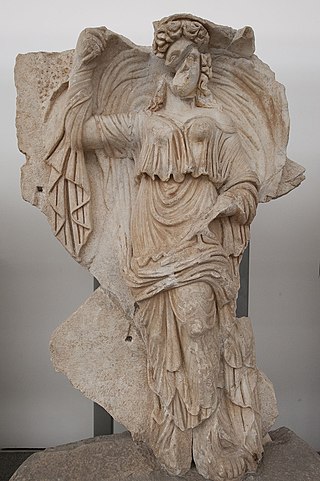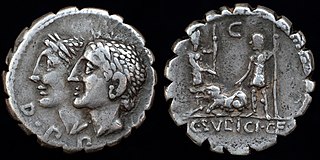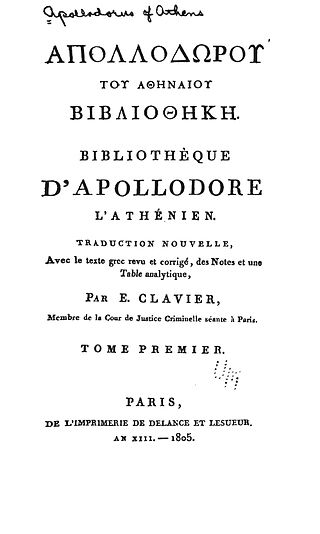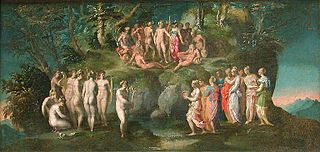
The Judgement of Paris is a story from Greek mythology, which was one of the events that led up to the Trojan War, and in later versions to the foundation of Rome.
In Greek mythology, Erebus, or Erebos, is the personification of darkness. In Hesiod's Theogony, he is the offspring of Chaos, and the father of Aether and Hemera (Day) by Nyx (Night); in other Greek cosmogonies, he is the father of Aether, Eros, and Metis, or the first ruler of the gods. In genealogies given by Roman authors, he begets a large progeny of personifications upon Nox, while in an Orphic theogony he is the offspring of Chronos (Time). The name "Erebus" is also used to refer either to the darkness of the Underworld, the Underworld itself, or the region through which souls pass to reach Hades, and can sometimes be used as a synonym for Tartarus or Hades.

In Greek mythology, Hemera was the personification of day. According to Hesiod, she was the daughter of Erebus (Darkness) and Nyx (Night), and the sister of Aether. Though separate entities in Hesiod's Theogony, Hemera and Eos (Dawn) were often identified with each other.

In Greek mythology, Hermaphroditus was a child of Aphrodite and Hermes. According to Ovid, he was born a remarkably handsome boy whom the naiad Salmacis attempted to rape and prayed to be united with forever. A god, in answer to her prayer, merged their two forms into one and transformed him into a hermaphrodite, he being considered the origin of the name. His name is compounded of his parents' names, Hermes and Aphrodite. He was one of the Erotes.

In ancient Roman religion, the Di Penates or Penates were among the dii familiares, or household deities, invoked most often in domestic rituals. When the family had a meal, they threw a bit into the fire on the hearth for the Penates. They were thus associated with Vesta, the Lares, and the Genius of the pater familias in the "little universe" of the domus.

The Bibliotheca, also known as the Bibliotheca of Pseudo-Apollodorus, is a compendium of Greek myths and heroic legends, arranged in three books, generally dated to the first or second century AD.

In ancient Greek religion and mythology, Pluto was the ruler of the Greek underworld. The earlier name for the god was Hades, which became more common as the name of the underworld itself. Pluto represents a more positive concept of the god who presides over the afterlife. Ploutōn was frequently conflated with Ploûtos, the Greek god of wealth, because mineral wealth was found underground, and because as a chthonic god Pluto ruled the deep earth that contained the seeds necessary for a bountiful harvest. The name Ploutōn came into widespread usage with the Eleusinian Mysteries, in which Pluto was venerated as both a stern ruler and a loving husband to Persephone. The couple received souls in the afterlife and are invoked together in religious inscriptions, being referred to as Plouton and as Kore respectively. Hades, by contrast, had few temples and religious practices associated with him, and he is portrayed as the dark and violent abductor of Persephone.

Classical mythology, also known as Greco-Roman mythology or Greek and Roman mythology, is the collective body and study of myths from the ancient Greeks and ancient Romans. Mythology, along with philosophy and political thought, is one of the major survivals of classical antiquity throughout later Western culture. The Greek word mythos refers to the spoken word or speech, but it also denotes a tale, story or narrative.
In Greek mythology, the Hyades are a sisterhood of nymphs that bring rain.
Fabius Planciades Fulgentius was a Latin writer of late antiquity. Four extant works are commonly attributed to him, as well as a possible fifth which some scholars include in compilations with much reservation. His mythography was greatly admired and highly influential throughout much of the medieval period, though less influential today.

In Greek mythology, Aether, Æther, Aither, or Ether is the personification of the bright upper sky. According to Hesiod, he was the son of Erebus (Darkness) and Nyx (Night), and the brother of Hemera (Day). In Orphic cosmogony Aether was the offspring of Chronos (Time), and the brother of Chaos and Erebus.

Genealogia deorum gentilium, known in English as On the Genealogy of the Gods of the Gentiles, is a mythography or encyclopedic compilation of the tangled family relationships of the classical pantheons of Ancient Greece and Rome, written in Latin prose from 1360 onwards by the Italian author and poet Giovanni Boccaccio.

In classical mythology, Cupid is the god of desire, erotic love, attraction and affection. He is often portrayed as the son of the love goddess Venus and the god of war Mars. He is also known as Amor. His Greek counterpart is Eros. Although Eros is generally portrayed as a slender winged youth in Classical Greek art, during the Hellenistic period, he was increasingly portrayed as a chubby boy. During this time, his iconography acquired the bow and arrow that represent his source of power: a person, or even a deity, who is shot by Cupid's arrow is filled with uncontrollable desire. In myths, Cupid is a minor character who serves mostly to set the plot in motion. He is a main character only in the tale of Cupid and Psyche, when wounded by his own weapons, he experiences the ordeal of love. Although other extended stories are not told about him, his tradition is rich in poetic themes and visual scenarios, such as "Love conquers all" and the retaliatory punishment or torture of Cupid.

Greek mythology is the body of myths originally told by the ancient Greeks, and a genre of ancient Greek folklore, today absorbed alongside Roman mythology into the broader designation of classical mythology. These stories concern the ancient Greek religion's view of the origin and nature of the world; the lives and activities of deities, heroes, and mythological creatures; and the origins and significance of the ancient Greeks' cult and ritual practices. Modern scholars study the myths to shed light on the religious and political institutions of ancient Greece, and to better understand the nature of myth-making itself.
In Classical mythology, Dolus (Deception) is a figure who appears in an Aesopic fable by the Roman fabulist Gaius Julius Phaedrus, where he is an apprentice of the Titan Prometheus. According to the Roman mythographer Hyginus, Dolus was the offspring of Aether and Terra (Earth), while Cicero has Dolus being the offspring of Aether and Dies (Day).
In Greek mythology, Perse is one of the 3,000 Oceanids, water-nymph daughters of the Titans Oceanus and Tethys. Her name was also spelled as Persa, Perseide, Persea or Perseis. Perse married Helios, the god of the sun, and bore him several children, most notably the sorceress-goddess Circe.

In Roman mythology, Dies was the personification of day. She was the daughter of Chaos and Caligo (Mist), and the counterpart of the Greek goddess Hemera.

In Greek mythology, the Pierides or Emathides (Ἠμαθίδες) were the nine sisters who defied the Muses in a contest of song and, having been defeated, were turned into birds. The Muses themselves are sometimes called by this name.